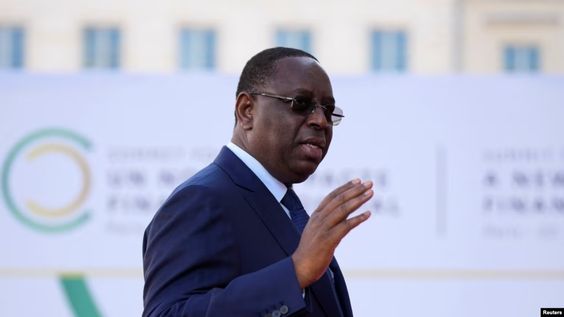Africa
Will Other African Leaders Be Affected by the Decision of the Leader of Senegal to Resign?

Opposition sympathizers and proponents of democracy in the nation rejoiced when President Macky Sall announced in a televised address on Monday that he will not run for a third term.
The 61-year-old president of Senegal claimed that his country “is bigger than” him and that it is “full of leaders equally capable of pushing the country toward emergence.”
The president made the right decision, according to Sall’s supporters like Dakar citizen Saidibou Sy. According to him, it would have been difficult for the nation if Sall had chosen to serve a third term.
Following rumors that the president might run for a third term, violent protests erupted throughout the West African country for weeks. Sall did not declare or deny his intention to run for reelection until Monday.
The president’s decision may have been motivated by rising pressure from the opposition, according to Mucahid Durmaz, a senior analyst at Verisk Maplecroft, a London-based provider of global risk intelligence.
Durmaz told VOA that the opposition coalition had been successful in using socioeconomic issues as a foundation for a broad-based movement of opposition to Sall’s administration. The large-scale demonstrations persuaded Sall that a third term would exacerbate polarization, threaten the nation’s democratic credentials, and jeopardize ongoing development projects.
Similar decisions are ‘unlikely’
Sall’s announcement received a lot of support, but Durmaz predicted that it would be difficult to persuade the authoritarian juntas that currently rule much of West Africa to follow suit.
Before winning re-election seven years later, Sall was originally elected president in 2012. Actions taken by him when he was in office, such as imprisoning opponents and ousting party officials who opposed his bid for a third term, were interpreted as an effort to maintain power.
On the continent, there has, however, always been disagreement about term limits.
In a referendum that experts believed was detrimental to efforts to advance democracy in Tunisia, the nation ratified a new constitution in 2022 that formally established President Kais Saied’s 65-year-old one-man rule. According to the New York advocacy organization Human Rights Watch, the new constitution eliminated a clause that had prohibited authorities from changing the two-term restriction.
The continent has produced its fair share of long-serving leaders, notably Teodoro Obiang Nguema Mbasogo of Equatorial Guinea, Paul Biya of Cameroon, Denis Sassou Nguesso of the Republic of Congo, Yoweri Museveni of Uganda, King Eswatini III of Eswatini, and Isaias Afwerki of Eritrea.
Senegal was notable
Observers claim that political unrest, coups, and countercoups in nations like as Mali, Burkina Faso, and Guinea have also stymied regional democratic processes. Senegal, however, stood apart for a while because of its orderly change in government.
According to Durmaz, “Senegal’s democratic culture has become deeply ingrained as a result of a well-organized civil society that has shielded democratic norms from leaders attempting to maintain power.” This isn’t the situation in countries like Cameroon, Tunisia, or Equatorial Guinea where civil society either doesn’t exist or has been severely repressed, according to the statement.
The Senegalese president was reportedly keeping a “verbal commitment” he made at the second Summit for Democracy in Washington, D.C., in March, according to Odeh Friday, the Nigerian country director for Accountability Lab, an advocacy group with a focus on governance.
Friday stated that “I think Sall’s unexpected decision could potentially serve as a shining example for other African leaders who face similar uncertainties about their political futures.”
“It is quite early to decide to see what it means for the African continent,” Friday said. “And it remains uncertain whether the decision will have a lasting impact on the behavior of other African leaders, even within the region,” he added.
